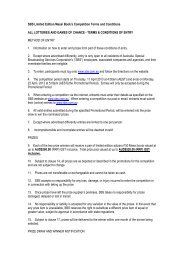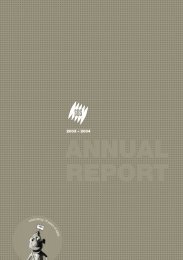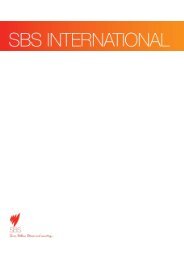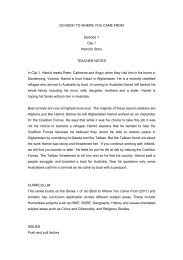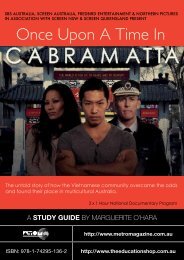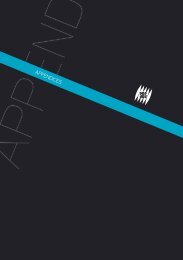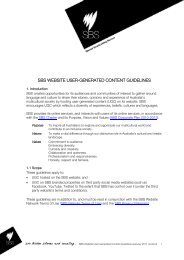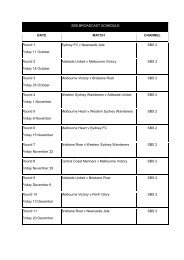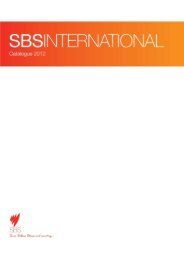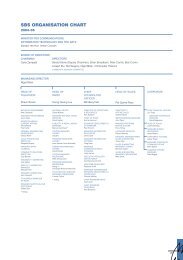AnnuAl REPORT 2011-2012 - Sbs
AnnuAl REPORT 2011-2012 - Sbs
AnnuAl REPORT 2011-2012 - Sbs
- TAGS
- annual
- media.sbs.com.au
You also want an ePaper? Increase the reach of your titles
YUMPU automatically turns print PDFs into web optimized ePapers that Google loves.
oRGaNISaTIoN<br />
Findings<br />
During <strong>2011</strong>–12 investigations into 219 formal<br />
complaints were completed. the SbS Ombudsman<br />
upheld 27 complaints and dismissed 127 complaints.<br />
eighteen of these upholds related to complaints about<br />
closed captioning. One complaint investigation was<br />
suspended at the request of the complainant.<br />
Sixty-four complaints were referred to the complaints<br />
committee which is chaired by the Managing Director,<br />
Michael ebeid, and comprises the Director of television<br />
and Online content, the Director of Audio and Language<br />
Services, the Director of News and current Affairs, the<br />
Director of Strategy and communication and the SbS<br />
Ombudsman.<br />
the 63 complaints about the Promise were of a<br />
similar nature and principally alleged a breach of SbS’s<br />
prejudice, racism and discrimination code. the matter<br />
was referred to the SbS complaints committee which did<br />
not uphold the complaints. the complaints committee<br />
found that the characterisations in the Promise did not<br />
cross the threshold into racism, and in particular did not<br />
promote, endorse, or reinforce inaccurate, demeaning or<br />
discriminatory stereotypes. the committee was satisfied<br />
that the ordinary reasonable viewer would appreciate that<br />
the Promise was a fictional drama.<br />
the complaints committee also met to consider the<br />
classification of the film chiko. the film is a drama<br />
about the drug underworld set in Hamburg and was<br />
broadcast as an MAv classified film. MAv is the highest<br />
classification level on free-to-air television. SbS had<br />
also provided additional consumer advice of ‘strong<br />
violence, drug use, very coarse language and a sex<br />
scene’. the complaints committee dismissed a<br />
complaint that the film was incorrectly classified. the<br />
complainant subsequently appealed the decision to<br />
the AcMA who also found there was no breach of the<br />
SbS codes of Practice.<br />
Overall the SbS Ombudsman upheld approximately<br />
17 per cent of formal complaints which was consistent<br />
with the previous year. the majority of these upheld<br />
complaints related to a range of technical issues with<br />
closed captioning which occurred during the transition<br />
phase to a digital service.<br />
60 SBS<br />
Australian Communications and Media Authority<br />
in <strong>2011</strong>–12 the AcMA completed two investigations<br />
which had continued from the previous two financial<br />
years. in july <strong>2011</strong> the AcMA found that SbS had not<br />
breached its complaints handling code by not exercising<br />
its discretion to investigate a complaint which was<br />
lodged out of time. in September <strong>2011</strong>, the AcMA<br />
found that SbS had breached code 4.5 (classification<br />
categories) by placing an M level promotion in a PG<br />
program that was broadcast in an M timeslot. the<br />
AcMA found that SbS had breached the code because<br />
effectively the PG program contained material that was<br />
greater than mild in impact.<br />
During <strong>2011</strong>–12 the AcMA commenced seven new<br />
investigations of SbS content. Six of these investigations<br />
were completed during <strong>2011</strong>–12 and five of the<br />
complaints were dismissed. One complaint relating to the<br />
classification of the film 13 tzameti was upheld by the<br />
AcMA. this complaint had previously also been upheld<br />
by the SbS Ombudsman. One AcMA investigation about<br />
closed captioning of SbS programs is still in progress.<br />
Matters required to be reported under<br />
other legislation<br />
Work Health and Safety Act <strong>2011</strong> (WHS Act)<br />
Transition from the Occupational Health and Safety Act<br />
1991 to WHS Act<br />
SbS has transitioned from the Occupational Health and<br />
Safety Act 1991 (OH&S Act) to the Work Health and<br />
Safety Act <strong>2011</strong> (WHS Act) which came into effect on<br />
1 january <strong>2012</strong>.<br />
SbS is committed to fostering a positive safety and<br />
wellbeing culture, and to ensuring the health and safety<br />
of all employees, freelancers, contractors at work, and<br />
members of the public who may be affected by our work.<br />
SbS engaged ernst & Young to conduct a WHS internal<br />
audit. the audit concluded that SbS is in a strong<br />
position in respect of its adherence to the WHS Act.<br />
the audit noted that SbS had prepared for the changes<br />
to the legislation by updating its WHS documentation<br />
and providing training on the WHS Act to Health and<br />
Safety committee Members, senior managers and the<br />
executive committee.



